| Listing 1 - 10 of 18 | << page >> |
Sort by
|
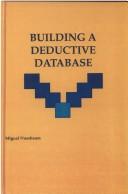
ISBN: 9780893917685 0893917680 Year: 1992 Publisher: Norwood, N.J.: Ablex,
Abstract | Keywords | Export | Availability | Bookmark
 Loading...
Loading...Choose an application
- Reference Manager
- EndNote
- RefWorks (Direct export to RefWorks)
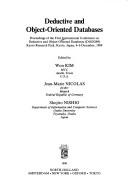
ISBN: 0444884335 132252114X 1483298191 9780444884336 Year: 1990 Publisher: Amsterdam : Elsevier,
Abstract | Keywords | Export | Availability | Bookmark
 Loading...
Loading...Choose an application
- Reference Manager
- EndNote
- RefWorks (Direct export to RefWorks)
Deductive databases --- Object-oriented databases --- Congresses --- Congresses. --- Deductive databases - Congresses --- Object-oriented databases - Congresses
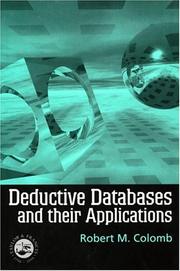
ISBN: 0748407960 0748407979 Year: 1998 Publisher: London ; Bristol, PA : Taylor & Francis,
Abstract | Keywords | Export | Availability | Bookmark
 Loading...
Loading...Choose an application
- Reference Manager
- EndNote
- RefWorks (Direct export to RefWorks)
Book
ISBN: 8323390185 Year: 2014 Publisher: Krakow : Jagiellonian University Press,
Abstract | Keywords | Export | Availability | Bookmark
 Loading...
Loading...Choose an application
- Reference Manager
- EndNote
- RefWorks (Direct export to RefWorks)
This book stands at the intersection of two topics: the decidability and computational complexity of hybrid logics, and the deductive systems designed for them. Hybrid logics are here divided into two groups: standard hybrid logics involving nominals as expressions of a separate sort, and non-standard hybrid logics, which do not involve nominals but whose expressive power matches the expressive power of binder-free standard hybrid logics.The original results of this book are split into two parts. This division reflects the division of the book itself. The first type of results concern model-theoretic and complexity properties of hybrid logics. Since hybrid logics which we call standard are quite well investigated, the efforts focused on hybrid logics referred to as non-standard in this book. Non-standard hybrid logics are understood as modal logics with global counting operators (M(En)) whose expressive power matches the expressive power of binder-free standard hybrid logics. The relevant results comprise:1. Establishing a sound and complete axiomatization for the modal logic K with global counting operators (MK(En)), which can be easily extended onto other frame classes,2. Establishing tight complexity bounds, namely NExpTime-completeness for the modal logic with global counting operators defined over the classes of arbitrary, reflexive, symmetric, serial and transitive frames (MK(En)), MT(En)), MD(En)), MB(En)), MK4(En)) with numerical subscripts coded in binary. Establishing the exponential-size model property for this logic defined over the classes of Euclidean and equivalential frames (MK5(En)), MS5(En)).Results of the second type consist of designing concrete deductive (tableau and sequent) systems for standard and non-standard hybrid logics. More precisely, they include:1. Devising a prefixed and an internalized tableau calculi which are sound, complete and terminating for a rich class of binder-free standard hybrid logics. An interesting feature of indicated calculi is the nonbranching character of the rule (¬D),2. Devising a prefixed and an internalized tableau calculi which are sound, complete and terminating for non-standard hybrid logics. The internalization technique applied to a tableau calculus for the modal logic with global counting operators is novel in the literature,3. Devising the first hybrid algorithm involving an inequality solver for modal logics with global counting operators. Transferring the arithmetical part of reasoning to an inequality solver turned out to be sufficient in ensuring termination.The book is directed to philosophers and logicians working with modal and hybrid logics, as well as to computer scientists interested in deductive systems and decision procedures for logics. Extensive fragments of the first part of the book can also serve as an introduction to hybrid logics for wider audience interested in logic.The content of the book is situated in the areas of formal logic and theoretical computer science with some elements of the theory of computational complexity.
Proof theory. --- Logic, Symbolic and mathematical. --- Deductive databases. --- Deductive data bases --- Databases --- Algebra of logic --- Logic, Universal --- Mathematical logic --- Symbolic and mathematical logic --- Symbolic logic --- Mathematics --- Algebra, Abstract --- Metamathematics --- Set theory --- Syllogism --- Logic, Symbolic and mathematical
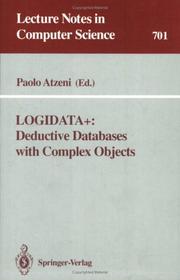
ISBN: 354056974X 038756974X 3540478442 Year: 1993 Volume: vol 701 Publisher: Berlin : Springer-Verlag,
Abstract | Keywords | Export | Availability | Bookmark
 Loading...
Loading...Choose an application
- Reference Manager
- EndNote
- RefWorks (Direct export to RefWorks)
This book presents a collection of coordinated scientific papers describing the work conducted and the results achieved within the LOGIDATA+ project, a research action funded by the Italian national research council CNR. Theaim of the LOGIDATA+ project is the definition of advanced database systems which significantly extend the functionalities of the current systems, with specific reference to the application areas for which relational systemsare not considered satisfactory. These new systems will allow the definitionof data with complex structures, the representation of semantic relationships between objects, and the use of powerful query and update languages. They will be based on a combination of techniques originatingfrom relational databases and logic programming, with contributions from object-oriented programming. The goal of the LOGIDATA+ project is the design, definition, and prototype implementation of a database management system with complex structures and a class hierarchy, to be accessed through a rule-based language. This book presents an integrated view of the project at the end of the first phase. The second phase will be mainly concerned with the implementation of prototypes.
Bases de données déductives --- Deductieve data bases --- Deductive data bases --- Deductive databases --- Data structures (Computer scienc. --- Database management. --- Data Structures and Information Theory. --- Database Management. --- Data base management --- Data services (Database management) --- Database management services --- DBMS (Computer science) --- Generalized data management systems --- Services, Database management --- Systems, Database management --- Systems, Generalized database management --- Electronic data processing
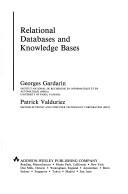
ISBN: 0201099551 9780201099553 Year: 1989 Publisher: Reading, Mass. Amsterdam San Juan Addison-Wesley
Abstract | Keywords | Export | Availability | Bookmark
 Loading...
Loading...Choose an application
- Reference Manager
- EndNote
- RefWorks (Direct export to RefWorks)
database management --- Information systems --- relationele databanken --- Banques de données--Gestion --- Bases de données relationnelles --- Data base management --- Database management --- Databasebeheer --- Databases--Beheer --- Gegevensbanken--Beheer --- Gegevensbestanden--Beheer --- Generalized data management systems --- Relational databases --- Relationele databases --- Systems [Data base management ] --- Systems [Generalized data base management ] --- Bases de données --- Gestion --- Bases de données --- Bases de données relationnelles --- Data base management. --- Relational data bases. --- Deductive Databases --- Relational Model --- Distributed --- Data Bases --- Knowledge Bases
Book
ISBN: 0201568977 Year: 1992 Publisher: Wokingham Addison-Wesley
Abstract | Keywords | Export | Availability | Bookmark
 Loading...
Loading...Choose an application
- Reference Manager
- EndNote
- RefWorks (Direct export to RefWorks)
Information systems --- Deductive databases --- Logic programming --- Bases de données déductives --- Programmation logique --- 681.3*H2 --- 681.3*I23 --- Computer programming --- Deductive data bases --- Databases --- Database management: security; integrity; protection--See also {?681.5*E5} --- Deduction and theorem proving: answer/reason extraction; reasoning; resolution; metatheory; mathematical induction; logic programming (Artificial intelligence) --- 681.3*I23 Deduction and theorem proving: answer/reason extraction; reasoning; resolution; metatheory; mathematical induction; logic programming (Artificial intelligence) --- 681.3*H2 Database management: security; integrity; protection--See also {?681.5*E5} --- Bases de données déductives
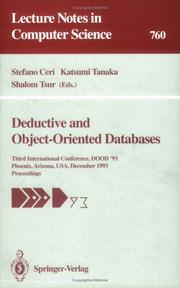
ISBN: 3540575308 3540482121 Year: 1993 Volume: 760 Publisher: Berlin ; Heidelberg ; New York Springer
Abstract | Keywords | Export | Availability | Bookmark
 Loading...
Loading...Choose an application
- Reference Manager
- EndNote
- RefWorks (Direct export to RefWorks)
This volume contains the proceedings of the Third International Conference on Deductive and Object-Oriented Databases. Its central tenet is that the object-oriented and deductive paradigms for modeling, organizing, and processing data complement each other, rather than competing, and that problems involving massive volumes of complex data can best be solved by integrating the best of both approaches. Central questions in the area are: - How do we design a tool that presents the best of the object-oriented and declarative ideas? - How can the users of this tool express their problems in a combination of declarative and procedural features? The volume includes 29 papers that contribute towards answering these questions.
Deductive databases --- Object-oriented databases --- Congresses. --- Deductive data bases --- Congresses --- Object-oriented data bases --- Computer science. --- Database management. --- Artificial intelligence. --- Programming Techniques. --- Database Management. --- Artificial Intelligence. --- Mathematical Logic and Formal Languages. --- AI (Artificial intelligence) --- Artificial thinking --- Electronic brains --- Intellectronics --- Intelligence, Artificial --- Intelligent machines --- Machine intelligence --- Thinking, Artificial --- Bionics --- Cognitive science --- Digital computer simulation --- Electronic data processing --- Logic machines --- Machine theory --- Self-organizing systems --- Simulation methods --- Fifth generation computers --- Neural computers --- Data base management --- Data services (Database management) --- Database management services --- DBMS (Computer science) --- Generalized data management systems --- Services, Database management --- Systems, Database management --- Systems, Generalized database management --- Informatics --- Science
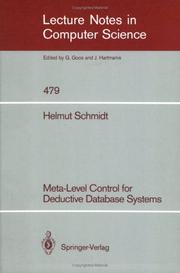
ISBN: 3540537546 3540470824 Year: 1991 Volume: 479 *25 Publisher: Berlin Heidelberg London Springer-Verlag
Abstract | Keywords | Export | Availability | Bookmark
 Loading...
Loading...Choose an application
- Reference Manager
- EndNote
- RefWorks (Direct export to RefWorks)
The development of database technology has currently reached the stage of deductive database systems which use Horn clauses for defining relations. An important characteristic of these systems is the clear separation of logic and control. However, the programmer cannot affect the control part of a deductive database system. To eliminate this deficiency, this monograph presents a so-called expert deductive database system that allows explicit control of the deduction process. The system consists of an object-level describing the logical aspects of a problem and of a meta-level that contains application-specific control information affecting the object-level deduction process. For example, object-level rules can be disregarded, and some tuples deduced at the object-level can be preferred to others. Besides the architecture of this system, the book also identifies some important possibilities of deduction control which are explained by characteristic examples.
Banques de données--Gestion --- Bases de données déductives --- Data base management --- Database management --- Databasebeheer --- Databases--Beheer --- Deductieve data bases --- Deductive data bases --- Deductive databases --- Gegevensbanken--Beheer --- Gegevensbestanden--Beheer --- Generalized data management systems --- Systems [Data base management ] --- Systems [Generalized data base management ] --- 681.3*H28 --- 681.3*H23 --- 681.3*H24 --- Database applications --- Languages: data description languages; DDL; data manupulation languages; DML;query languages; report writers (Database management) --- Systems: concurrency; distributed systems; query processing; transaction processing (Database management) --- Database management. --- Deductive databases. --- 681.3*H24 Systems: concurrency; distributed systems; query processing; transaction processing (Database management) --- 681.3*H23 Languages: data description languages; DDL; data manupulation languages; DML;query languages; report writers (Database management) --- 681.3*H28 Database applications --- Databases --- Data services (Database management) --- Database management services --- DBMS (Computer science) --- Services, Database management --- Systems, Database management --- Systems, Generalized database management --- Electronic data processing --- Data structures (Computer scienc. --- Artificial intelligence. --- Data Structures and Information Theory. --- Database Management. --- Artificial Intelligence. --- AI (Artificial intelligence) --- Artificial thinking --- Electronic brains --- Intellectronics --- Intelligence, Artificial --- Intelligent machines --- Machine intelligence --- Thinking, Artificial --- Bionics --- Cognitive science --- Digital computer simulation --- Logic machines --- Machine theory --- Self-organizing systems --- Simulation methods --- Fifth generation computers --- Neural computers
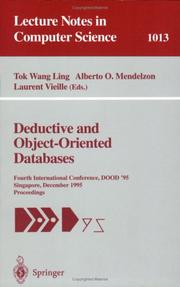
ISBN: 3540484604 3540606084 0387606084 Year: 1995 Volume: 1013 Publisher: Berlin : Springer-Verlag,
Abstract | Keywords | Export | Availability | Bookmark
 Loading...
Loading...Choose an application
- Reference Manager
- EndNote
- RefWorks (Direct export to RefWorks)
This book constitutes the refereed proceedings of the 4th International Conference on Deductive and Object-Oriented Databases, DOOD '95, held in Singapore in December 1995. Besides two keynote papers by Stefano Ceri and Michael Kifer, the book contains revised full versions of 28 papers selected from a total of 88 submissions. The volume gives a highly competent state-of-the-art report on DOOD research and advanced applications. The papers are organized in sections on active databases, query processing, semantic query optimization, transaction management, authorization, implementation, and applications.
Deductive databases --- Object-oriented databases --- Computer Science --- Engineering & Applied Sciences --- Congresses --- Deductive data bases --- Object-oriented data bases --- Deductive databases - Congresses. --- Object-oriented databases - Congresses. --- Database management. --- Information theory. --- Computer science. --- Artificial intelligence. --- Information technology. --- Database Management. --- Theory of Computation. --- Programming Techniques. --- Artificial Intelligence. --- IT in Business. --- Communication theory --- Communication --- Cybernetics --- Data base management --- Data services (Database management) --- Database management services --- DBMS (Computer science) --- Generalized data management systems --- Services, Database management --- Systems, Database management --- Systems, Generalized database management --- Electronic data processing --- IT (Information technology) --- Technology --- Telematics --- Information superhighway --- Knowledge management --- Informatics --- Science --- AI (Artificial intelligence) --- Artificial thinking --- Electronic brains --- Intellectronics --- Intelligence, Artificial --- Intelligent machines --- Machine intelligence --- Thinking, Artificial --- Bionics --- Cognitive science --- Digital computer simulation --- Logic machines --- Machine theory --- Self-organizing systems --- Simulation methods --- Fifth generation computers --- Neural computers --- Computers. --- Computer programming. --- Business—Data processing. --- Computers --- Electronic computer programming --- Electronic digital computers --- Programming (Electronic computers) --- Coding theory --- Automatic computers --- Automatic data processors --- Computer hardware --- Computing machines (Computers) --- Electronic calculating-machines --- Electronic computers --- Hardware, Computer --- Computer systems --- Calculators --- Cyberspace --- Programming
| Listing 1 - 10 of 18 | << page >> |
Sort by
|

 Search
Search Feedback
Feedback About
About Help
Help News
News